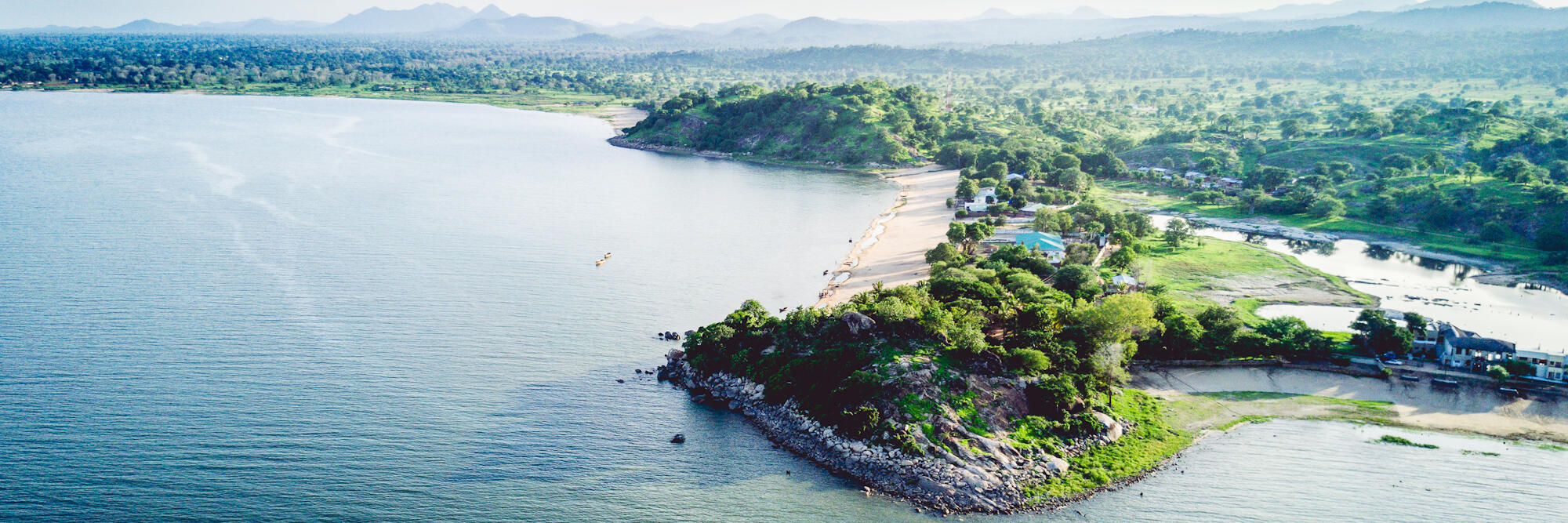Gabi is a Third-Culture kid who moved to Malawi permanently in 2012 and works in the tourism industry selling safari and beach holidays across Malawi, Zambia, Zimbabwe and Mozambique. Although her family were all born and brought up in Malawi, Gabi spent much of her childhood moving around the world, but Malawi was always calling her home. In her interview with Expat Arrivals, Gabi talks about the quality of life in Malawi and the must-do weekend getaways.
Read more about Malawi in our Expat Arrivals Malawi country guide.
About Gabi
Q: Where are you originally from?
A: Tricky question! Mum’s English, Dad’s Italian (but born and brought up in Malawi along with the rest of my extended family). I was born in England and spent my childhood travelling the world! So, a bit of a third-culture kid, but Malawi was always home base.
Q: Where are you currently living?
A: Lilongwe, Malawi
Q: When did you move here?
A: On and off throughout my life, but permanently moved back after university in 2012.
Q: Is this your first expat experience?
A: No, my mum was with the British Foreign Office, so I’ve been an expat in Swaziland, Fiji and Albania.
Q: Did you move here alone or with a spouse/family?
A: I came alone, but my whole extended family lives here, so I wasn’t too alone.
Q: Why did you move? What do you do?
A: I was in my gap year and did my travelling and working abroad. Eventually, I ran out of money and things to do, so I came back for a visit before going off to university and ended up meeting my now husband, so I stuck around!
Living in Lilongwe
Q: What do you enjoy most about Lilongwe?
A: There are many different ideas of quality of life. I personally think ours trumps them all. We may not have fancy restaurants, glamorous bars or designer shops, but we have a close community, fantastic weather, big gardens, domestic helpers and the wilderness on our doorstep.
Q: Any negative experiences? What do you miss most about home?
A: If I were to compare it to, say, England, I would say the frustration of not being able to pop to the shop and get all the ingredients you need for that Jamie Oliver recipe you’re dying to try! Also, the load shedding, a few months of the year, we experience up to 6-hour power cuts daily.
Q: What are the biggest adjustments you had to make when settling into life here? Did you experience any particular elements of culture shock?
A: The Malawians have the time. Want some maintenance at the house? Don’t expect someone to be on time or complete it in a timely fashion, but they’ll arrive with a big grin and a funny story!
Q: What’s the cost of living compared to home? Is there anything particularly expensive or particularly cheap in Malawi?
A: Compared to England, some aspects are much more expensive, and some are much cheaper. For example, here 500g Lurpak butter will cost you GBP 9, but a bottle of the local gin will cost you GBP 5. Holidays that people dream of going on their whole lives can also be pretty cheap. Lucky for us, we get great resident rates at some high-end lodges who want to fill their beds during their quiet times.
Q: How would you rate the public transport in Lilongwe? What is your most memorable experience of using the city’s transport system?
A: It’s not something you want to rely on. Again, the Malawians have the time, and there’s no such thing as late-night taxis after a night out unless you have a reliable driver that you use often. But getting around Old Town in the day is easy-peasy, hop on a tuk-tuk or a bicycle taxi! These guys have thighs of steel and will shoot you up any hill without breaking a sweat – One day, I’ll start a Malawian Tour de France team.
Q: How would you rate the healthcare in Lilongwe? Have you had any particularly good/bad experiences with regard to doctors and hospitals? Are there any hospitals you would recommend?
A: Healthcare is varied; it’s a good idea to get good health insurance based in South Africa that includes emergency evacuation to South Africa should anything happen that can’t be treated or cared for in Malawi. There are some great hospitals with expat doctors, but they sometimes don’t have the facilities for certain needs. The pharmacies are great here, and you can order anything you need if they don’t have it in stock.
Q: What are the biggest safety issues facing expats living in Lilongwe or Malawi? Are there any areas expats should avoid?
A: The roads can be very dangerous, particularly on long-distance drives to the lake or further afield. They are poorly maintained and often have crossing livestock and many bicycles. It’s also good to note that a lot of the locals have bought their driving licences, so they aren’t the best drivers! Drive slow, have eyes in the back of your head and get used to using that horn!
Q: How do you rate the standard of housing in Lilongwe? What different options are available for expats?
A: The housing standards vary massively. A lot of the houses here are old colonial builds, so they have good bones but may need a bit of sprucing up if they haven’t already. The upside is that they’re big, have large gardens and often a swimming pool. You’ll pay the same rent (if not less) for a four-bed house with a pool here as you would for a one-bed flat in London.
Q: Any areas or suburbs you’d recommend for expats to live in?
A: Areas 10, 11, 12 and 43 are in the new part of the city and are leafy suburbs; there are a few restaurants and bars here. Area 3 and Area 9 are close to Old Town, so they have access to all the restaurants, shops and banks.
Meeting people and making friends in Lilongwe
Q: How tolerant are the locals of foreigners? Is there obvious discrimination against any particular group? Have you ever experienced discrimination in Lilongwe?
A: In some countries in Africa, you can certainly feel an underlying resentment or discrimination, but here in Malawi, I’m not exaggerating when I say they are the friendliest people you’ll meet. It’s not called the ‘warm heart of Africa’ for nothing. The people here are always up for a chat, a giggle and a little song and dance. I’ve never felt discriminated against. Just treat the locals with respect, and they’ll do the same to you.
Q: Was meeting people and making friends easy? How did you go about meeting new people?
A: Incredibly easy; the community here is so important, and everyone knows it. With old friends leaving and new people coming in all the time, everyone welcomes you with open arms. Meet one person, and they’ll have you at a braai (barbecue) that weekend, where you’ll meet the rest of the crowd, and soon you’ll find your weekends full all year round.
Q: Have you made friends with locals, or do you mix mainly with other expats? What advice would you give to new expats looking to make friends with the locals?
A: Yes, absolutely. Everywhere I’ve worked, I’ve been one of the few or the only expat in the office, and local Malawians have such great energy and a fabulous sense of humour that it’s impossible not to be friends. If you’re looking to broaden your circle, attend any of the events going on in the city or pop to a bar and order a round of drinks!
Working in Lilongwe
Q: Was getting a work permit or visa a relatively easy process? Did you tackle the visa process yourself, or did you enlist the services of an immigration consultant?
A: I have a permanent residence permit. It can be a long and tiresome experience, but make friends with one of the guys in the immigration office, and you can pester him until it’s done (with a little side payment, of course)!
Q: What is the economic climate in the city like? Do you have any tips for expats looking to find a job? Which resources did you find most useful?
A: The economy here can be very temperamental. It has fluctuated drastically in past years, but luckily, it seems to have levelled off and become quite stable. Unfortunately, if you are hired locally, you are not going to be getting the kind of salary that the equivalent job would yield in Europe or the US, but everything is relative. There’s no particular organisation that deals with recruitment; however, the expat community has an email and Facebook group where jobs are often advertised.
Final thoughts
Q: Where can one visit or spend a weekend near Lilongwe?
A: The famous Lake Malawi, the 9th largest in Africa: Get to the lake as often as you can! We go every month, just 1.5 hours out of town. There’s no excuse to get to the beach, get in the water and enjoy some time away from town.
Make sure to also visit South Luangwa National Park as well. A four-hour drive from Lilongwe and you’re in a wilderness haven with a dense population of wildlife, including lions, elephants, leopards, hippos, wild dogs, giraffes and many more; if you don’t fancy crossing the border, head to Liwonde National Park (Malawi’s version of South Luangwa, 3.5 hours’ drive). Here, they have lions, cheetahs, elephants, black rhinos, zebras, hippos and fantastic bird life. Check out this blog for your info: 11 must-do things in Malawi
Q: Is there any advice you would like to offer new expat arrivals to Lilongwe or Malawi?
A: Bring an open mind and a laid-back attitude. You can’t spend your days getting frustrated with bad drivers and slow workers. Learn to be like a Malawian, smile your way through the challenges, and have a laugh. Appreciate the smaller pleasures in life like freshly grown vegetables from your garden, fresh fruit vendors on your way to work, the shining sun, the cheerful music that’s always playing from somewhere, dancing kids on the side of the road, rugby braais in the garden, sunsets to die for and bright starry nights.
► Interviewed October 2019



